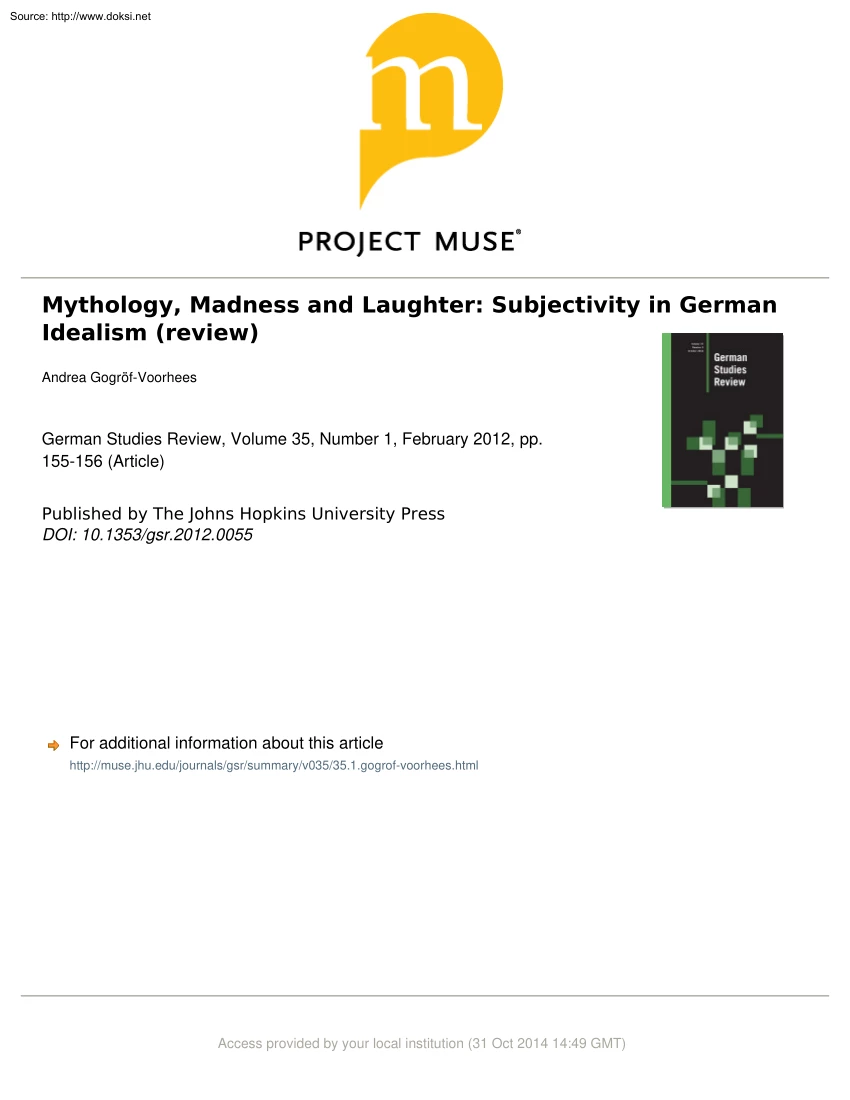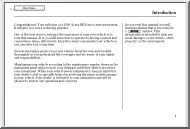Please log in to read this in our online viewer!

Please log in to read this in our online viewer!
No comments yet. You can be the first!
What did others read after this?
Content extract
Source: http://www.doksinet 0WKRORJ0DGQHVVDQG/DXJKWHU
6XEMHFWLYLWLQ*HUPDQ ,GHDOLVP UHYLHZ Andrea Gogröf-Voorhees German Studies Review, Volume 35, Number 1, February 2012, pp. 155-156 (Article) 3XEOLVKHGE7KH-RKQV+RSNLQV8QLYHUVLW3UHVV DOI: 10.1353/gsr20120055 For additional information about this article http://muse.jhuedu/journals/gsr/summary/v035/351gogrof-voorheeshtml Access provided by your local institution (31 Oct 2014 14:49 GMT) Source: http://www.doksinet Reviews 155 The study’s intent is not so much to offer or defend a proposition, but rather to provide a discussion and analysis; it is in that sense very much a dissertation as opposed to a thesis. The research is broad, the content informative, and the writing quite engaging While Dr Dutchman-Smith does not directly approach the big question as to what Hoffmann’s tales are all about, she does wish to portray him as a thinker, an author concerned with ideas. Thus she writes in her conclusion, “I
have demonstrated that alcoholic themes, structures, and symbols were used by Hoffmann in his literary works to express many different ideas, touching on many different areas of concern, be they artistic, political, medical and/or moral” (170). She also seems clearly to adhere to the view, especially prevalent among critics influenced by the neo-Romanticism of the turn to the twentieth century in its making a religion of art, that Hoffmann is largely concerned with depicting what came to be called the problem of the artist or the development of artistic sensibility. She comments, for example, regarding Der goldne Topf (107), “I do however wish to show that Anselmus’s use of and attitude toward alcohol features early on in the tale, and his changing relationship with drink plays an important role in locating him at particular stages in his artistic development.” In sum, Dutchman-Smith has produced the most interesting and informative discussion of Hoffmann’s relationship to
drink and the use made of that relationship by him in his literary works and by his critics in judging him, all in the context of attitudes toward the use of alcohol in their respective times. James M. McGlathery, University of Illinois at Urbana-Champaign Mythology, Madness and Laughter: Subjectivity in German Idealism. By Markus Gabriel and Slavoj Žižek. London: Continuum, 2009 Pp 202 Cloth $2495 ISBN 978-1441191052. The fetching title of this book is misleading. Those who are interested in learning about mythology, laughter, and madness as constitutive concepts defining German Idealism are in for a challenging surprise. This book, divided into three parts (part one by Markus Gabriel, parts two and three by Slavoj Žižek), with each part divided into essays of unequal length, is for specialists of German Idealism exclusively. Academics with background knowledge only will gain, perhaps, some small insights of value concerning the debate between the (post)modern ontological
argument and the one supporting traditional epistemology. The main argument, however, gets lost through Gabriel and Žižek’s conceptual virtuosity. Here is just one example: “The weird sounding syntagm ‘coefficient of adversity’ belongs to G. Bachelard who reproached Husserl’s phenomenology with ignoring the inertia of objects resisting subjective appropriation in its notion of noematic objectivity as constituted by the transcendental subject’s noetic activity” (Žižek 156). Source: http://www.doksinet 156 German Studies Review 35 /1 • 2012 However, the leading idea of the book is sensible. The authors posit Kant’s “critique of all possible metaphysics” (1) once more as the cornerstone of modern philosophy, to show how post-Kantian Idealism still represents the most sophisticated and, ironically enough, realistic way to think of philosophy and subjective consciousness and personal agency today. Countering the conservative school of analytical philosophy
(i.e, Moore and Russell) that defends Kant as the last philosopher “who makes sense” against the “undisciplined regressions into meaningless speculation” performed by the main representatives of the post-Kantian turn, namely Schelling, Hegel, and Fichte, and weary of the “continental,” post-Hegelian deconstructionist, poststructuralist, and neopragmatist philosophers who see the post-Kantian turn as the central, yet untranslatable philosophical event always already on its way and yet to be deciphered, Gabriel and Žižek propose to tackle what they see as having so far been neglected by these two camps (the nature of the absolute and the concept of finitude) and to offer new and original perspectives on the problem of subjectivity in German Idealism. Simply put, their argument advances, and their examples illustrate, that contemporary philosophy, analytical and continental, fails to recognize that the works of Fichte, Schelling, and Hegel contain in themselves and thus
already anticipate the “alleged” post-Hegelian turn defined by the suspicion of any form of dialectical mediation as a process of world-, truth-, and self-formation. Neither Gabriel nor Žižek promote a return to (neo-) Hegelianism as a justification of the “necessity of contingency” (Gabriel 52). However, both debunk contemporary tendencies in modern philosophy, politics, and culture to naively or conveniently embrace indeterminacy and ethical relativism to the detriment of (all-too-often traumatic) concrete historical reality and personal accountability. Gabriel, in his defense of what I would call conscious mythology, defends self-reflexivity, the actualized, concrete paradox of subjective consciousness as the fundamental and positive, creative and “real” activity, in a welcome moment of clarity: “The world creates images of itself in the activity of our creation of images of the world.” This does not elevate the world to the realm of theory, but posits it as a
(present and finite) creation out of our own doing in the here and now: “Our world pictures are not cheap copies of what there really is because they are an essential aspect of what there really is” (Gabriel 35). Similarly, Žižek’s insightful reevaluation of the Hegelian concept of “habit” as the saving “grace” from madness and his analysis of the Fichtean laughter as the expression of the Lacanian marker of humanness, “terrifying excess” as in the infamous “objet a,” shows his justified plea for an honest acknowledgement of (repressed) human self-limitation as the thing to be tackled anew and perhaps radicalized. Andrea Gogröf-Voorhees, Western Washington University
have demonstrated that alcoholic themes, structures, and symbols were used by Hoffmann in his literary works to express many different ideas, touching on many different areas of concern, be they artistic, political, medical and/or moral” (170). She also seems clearly to adhere to the view, especially prevalent among critics influenced by the neo-Romanticism of the turn to the twentieth century in its making a religion of art, that Hoffmann is largely concerned with depicting what came to be called the problem of the artist or the development of artistic sensibility. She comments, for example, regarding Der goldne Topf (107), “I do however wish to show that Anselmus’s use of and attitude toward alcohol features early on in the tale, and his changing relationship with drink plays an important role in locating him at particular stages in his artistic development.” In sum, Dutchman-Smith has produced the most interesting and informative discussion of Hoffmann’s relationship to
drink and the use made of that relationship by him in his literary works and by his critics in judging him, all in the context of attitudes toward the use of alcohol in their respective times. James M. McGlathery, University of Illinois at Urbana-Champaign Mythology, Madness and Laughter: Subjectivity in German Idealism. By Markus Gabriel and Slavoj Žižek. London: Continuum, 2009 Pp 202 Cloth $2495 ISBN 978-1441191052. The fetching title of this book is misleading. Those who are interested in learning about mythology, laughter, and madness as constitutive concepts defining German Idealism are in for a challenging surprise. This book, divided into three parts (part one by Markus Gabriel, parts two and three by Slavoj Žižek), with each part divided into essays of unequal length, is for specialists of German Idealism exclusively. Academics with background knowledge only will gain, perhaps, some small insights of value concerning the debate between the (post)modern ontological
argument and the one supporting traditional epistemology. The main argument, however, gets lost through Gabriel and Žižek’s conceptual virtuosity. Here is just one example: “The weird sounding syntagm ‘coefficient of adversity’ belongs to G. Bachelard who reproached Husserl’s phenomenology with ignoring the inertia of objects resisting subjective appropriation in its notion of noematic objectivity as constituted by the transcendental subject’s noetic activity” (Žižek 156). Source: http://www.doksinet 156 German Studies Review 35 /1 • 2012 However, the leading idea of the book is sensible. The authors posit Kant’s “critique of all possible metaphysics” (1) once more as the cornerstone of modern philosophy, to show how post-Kantian Idealism still represents the most sophisticated and, ironically enough, realistic way to think of philosophy and subjective consciousness and personal agency today. Countering the conservative school of analytical philosophy
(i.e, Moore and Russell) that defends Kant as the last philosopher “who makes sense” against the “undisciplined regressions into meaningless speculation” performed by the main representatives of the post-Kantian turn, namely Schelling, Hegel, and Fichte, and weary of the “continental,” post-Hegelian deconstructionist, poststructuralist, and neopragmatist philosophers who see the post-Kantian turn as the central, yet untranslatable philosophical event always already on its way and yet to be deciphered, Gabriel and Žižek propose to tackle what they see as having so far been neglected by these two camps (the nature of the absolute and the concept of finitude) and to offer new and original perspectives on the problem of subjectivity in German Idealism. Simply put, their argument advances, and their examples illustrate, that contemporary philosophy, analytical and continental, fails to recognize that the works of Fichte, Schelling, and Hegel contain in themselves and thus
already anticipate the “alleged” post-Hegelian turn defined by the suspicion of any form of dialectical mediation as a process of world-, truth-, and self-formation. Neither Gabriel nor Žižek promote a return to (neo-) Hegelianism as a justification of the “necessity of contingency” (Gabriel 52). However, both debunk contemporary tendencies in modern philosophy, politics, and culture to naively or conveniently embrace indeterminacy and ethical relativism to the detriment of (all-too-often traumatic) concrete historical reality and personal accountability. Gabriel, in his defense of what I would call conscious mythology, defends self-reflexivity, the actualized, concrete paradox of subjective consciousness as the fundamental and positive, creative and “real” activity, in a welcome moment of clarity: “The world creates images of itself in the activity of our creation of images of the world.” This does not elevate the world to the realm of theory, but posits it as a
(present and finite) creation out of our own doing in the here and now: “Our world pictures are not cheap copies of what there really is because they are an essential aspect of what there really is” (Gabriel 35). Similarly, Žižek’s insightful reevaluation of the Hegelian concept of “habit” as the saving “grace” from madness and his analysis of the Fichtean laughter as the expression of the Lacanian marker of humanness, “terrifying excess” as in the infamous “objet a,” shows his justified plea for an honest acknowledgement of (repressed) human self-limitation as the thing to be tackled anew and perhaps radicalized. Andrea Gogröf-Voorhees, Western Washington University




